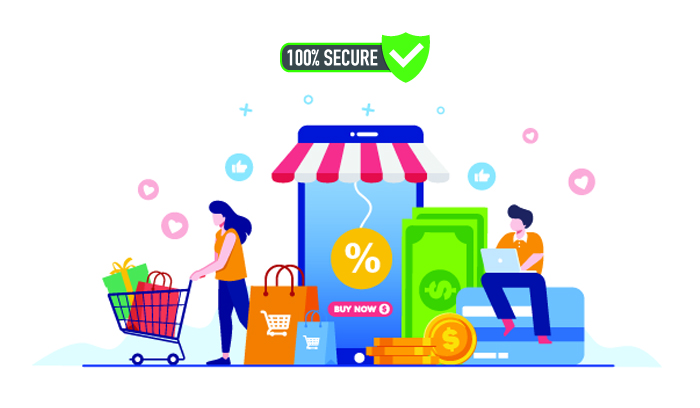
With online shopping at an all-time high, the world of ecommerce is booming. The ease of being able to shop from your own home 24/7 is an attractive feature to customers. However, with the increasing use of ecommerce, the risks to cyber security are increasing at an alarming rate. By using an assortment of methods to target websites, such as DDoS attacks, malware, phishing attempts and social engineering, attackers can steal information from either the server itself or the client. You can also be locked out from your website or have it taken down.
Due to the sensitive nature of the information that is shared during transactions, such as credit card information and login credentials, ecommerce websites need to maintain a high level of security in order to retain customer trust and protect their data.
Maintaining customer trust is invaluable. Customers are understandably hesitant to use a website that has suffered a data breach in the past. Furthermore, having good security measures allows your website to be ranked favorably by search engines and ranking websites, which increases the credibility of your website and helps to increase your website traffic.
Here’s how you can secure ecommerce websites from hackers.
1. Make sure your website meets the PCI DSS:
Let us start from the beginning. The Payment Card Industry Data Security Standard (PCI DSS) are a set of security standards that your website needs to meet in order for credit card companies to allow you to conduct online transactions with customers who use the company’s credit cards. The PCI standard is enforced by the Payment Card Industry Security Standards Council and its function is to protect the card holders’ data.
The exact protocol varies according to the nature of your website and the number of transactions that are handled. In any case, failure to meet the required standard can result in penalties and fines.
Businesses that are based in the EU, or those who conduct business internationally with EU regions need to meet the General Data Protection Regulation (GDPR).
2. Limit the Data you store on your website:
While collecting data from the customer is necessary to complete transactions smoothly, all the data you store on your website needs to be secure. Consequently, a good rule of thumb is to only store the data you need to conduct transactions smoothly
3. Encourage the use of strong passwords:
Complex passwords are harder for hackers to crack. Customers should be encouraged to use stronger passwords by requiring them to have a password that has a minimum of 6 letters, and a mixture of numbers, symbols, uppercase and lowercase letters.
4. Use Multi-Factor Authentication and/or 2-Step Verification:
2-Step Verification (2SV) requires customers to enter a code sent to them through text or email while setting up their account. Multi-Factor Authentication (MFA) is accomplished by requiring users to use a different device to confirm their identity before allowing them to login. Both 2SV and MFA are additional security measures that can be used along with passwords to increase account security.
5. Get an SSL Certificate for your Website:
Secure Socket Layer (SSL) certificates increase security by establishing an encrypted connection between the user and the website. An SSL Certificate is issued by a Certificate Authority (CA), and getting an SSL certificate through a credible CA is key to gaining the maximum benefits of certification. There are tons of Wildcard SSL certificate providers out there.
Acquiring an SSL Certificate allows you to enable Hypertext Transfer Protocol Secure (HTTPS) on your website, which not only secures your website against attackers, but also signifies credibility to tech-savvy customers by having the https:// prefix before your website name in the browser address bar. Search engines also preferentially display https:// websites in search results. Investing in an SSL certificate can therefore increase traffic to your website. A number of CAs offer discounts through coupons and promo codes, which is a resource that smaller businesses can take advantage of.
6. Be Vigilant:
Opportunistic attackers are continuously looking for weak spots in cyber security systems, and ecommerce website managers always need to be one step ahead to protect customer data. Try to install security patches as soon as they are released to remove vulnerabilities in your security system. Using multiple security layers is an effective method of deterring attackers. Using cloud-based DDoS protection services protects your website from potential DDoS attacks.
7. Make Regular Data Backups:
This goes without saying. Having to make regular data backups can be a hassle, but they will ensure that your website runs as smoothly as possible in case of a security breach.
8. Host your Website on a Safe Ecommerce Platform:
Using a secure, cloud-based ecommerce platform is an easy way to ensure your site’s security. A good platform can do a lot of the work of maintaining security for you, by using measures such as efficient conduction of transactions and fraud preventing features. Hosting your ecommerce website on a credible, ISO certified ecommerce platform is a service worth investing in.
Coupon and promo codes provide an accessible way to subscribe to an ecommerce platform for small to medium sized businesses. Statistics providing coupon code insights reveal an increasing use of coupons, especially with the advent of digital coupons and promo codes. In addition to increasing sales by issuing discount coupons themselves, businesses can use promo codes and coupons during the process of establishing their websites and ramping up their security.
As more and more businesses move to ecommerce to maximize their sales and visibility to customers, they also provide increasing opportunities to attackers. Taking the time to invest in a good security plan allows you to cover all your bases and join the competition without compromising on your business’s safety.